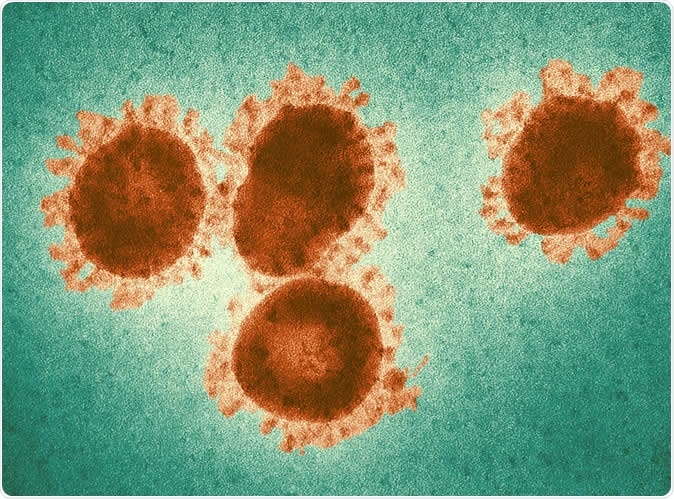Amid the global health crisis of the coronavirus (COVID-19), scientists from around the world are racing to find a treatment to stop the deadly virus. The sudden acute respiratory syndrome coronavirus 2 (SARS-CoV-2) has spread across 46 countries, infecting more than 82,000 and killing more than 2,800 people.
However, there is hope as a team of researchers designed compounds that can block the replication of similar coronaviruses, including the SARS-CoV-2, which causes the coronavirus disease (COVID-19).
Though the compounds showed promise in the laboratory, human trials have not commenced yet.

Coronaviruses, which include the MERS and SARS pathogens, are characterized by a wreath of coat proteins that can be seen via a microscope. / Photo: CDC / Fred Murphy
Share similar properties
The Wuhan coronavirus, officially called SARS-CoV-2, is a close cousin to the severe acute respiratory syndrome (SARS) virus (SARS-CoV-1) that caused the SARS outbreak in 2002-2003 and the Middle East respiratory disease virus (MERS-CoV) that emerged in 2012.
All of these diseases cause similar symptoms, including flu-like symptoms and pneumonia-like illness. Commonly, the diseases cause fever, dry cough, and shortness of breath, which then gradually worsens and can lead to respiratory distress. However, until now, there are no effective treatments developed to fight the viruses.
Mostly, since there is a small number of cases in the past, it did not warrant significant investments by pharmaceutical companies. Now, with the emergence of the novel coronavirus outbreak and its rapid advance to pandemic status, treatment is needed.
In a new study published in the ACS' Journal of Medicinal Chemistry, a team of researchers has proposed a new way to target and kill coronaviruses. The compounds under research can also hinder the spread of other viruses, such as enteroviruses, which cause common colds, the summer flu, and foot and mouth disease.
All these pathogens share a similar protein-cutting enzyme, dubbed as the main protease in coronaviruses and the 3C protease in enteroviruses, which are crucial for viral replication.
"The main protease of coronaviruses and the 3C protease of enteroviruses share a similar active-site architecture and a unique requirement for glutamine in the P1 position of the substrate. Because of their unique specificity and essential role in viral polyprotein processing, these proteases are suitable targets for the development of antiviral drugs," the researchers wrote on the paper.
A versatile inhibitor
To test their theory, the researchers studied X-ray crystal structures of the proteases. They created a series of ketoamide compounds they thought could fit perfectly in the enzyme's active site. This way, it will interfere with their function.
In the laboratory, the team tested the molecules in test tubes and human cells. During the experiment, they found a versatile inhibitor, which can block multiple enteroviruses and coronaviruses, including the one that caused the SARS outbreak in 2003.
About six crystal structures of protease-inhibitor complexes were identified, and they were tested against the recombinant proteases, viral replicons, and virus-infected cell cultures. Another molecule showed potent activity against the MERS-CoV and moderate activity against the other viruses.
The researchers suggest that since the MERS-CoV, SARS-CoV-1, and SARS-CoV-2 are similar when it comes to their structures and mechanism of infection, the inhibitors will most likely show good antiviral activity against the dreaded novel coronavirus that is spreading rapidly across the globe.
The team plans to conduct animal studies to develop a possible and promising antiviral drug to stem the Wuhan coronavirus outbreak and future bouts of coronavirus outbreaks.
The coronavirus global crisis
The novel coronavirus, now officially called coronavirus disease (COVID-19), has spread rapidly to 46 countries. Every day, new countries are reporting their first cases of the deadly virus, prompting governments to impose travel restrictions in the bid to contain the virus.
The coronavirus causes respiratory distress in the worst cases. Though the death rate of the virus is 2.3 percent to 3.4 percent, there are now a total of 2,801 deaths reported, most of whom were from Hubei province in China, the epicenter of the outbreak.
Though the virus has spread across continents, the WHO has not classified it yet as a pandemic.
Journal reference:
α-Ketoamides as Broad-Spectrum Inhibitors of Coronavirus and Enterovirus Replication: Structure-Based Design, Synthesis, and Activity Assessment, Linlin Zhang, Daizong Lin, Yuri Kusov, Yong Nian, Qingjun Ma, Jiang Wang, Albrecht von Brunn, Pieter Leyssen, Kristina Lanko, Johan Neyts, Adriaan de Wilde, Eric J. Snijder, Hong Liu, Rolf Hilgenfeld, J. Med. Chem. 2020, https://pubs.acs.org/doi/10.1021/acs.jmedchem.9b01828